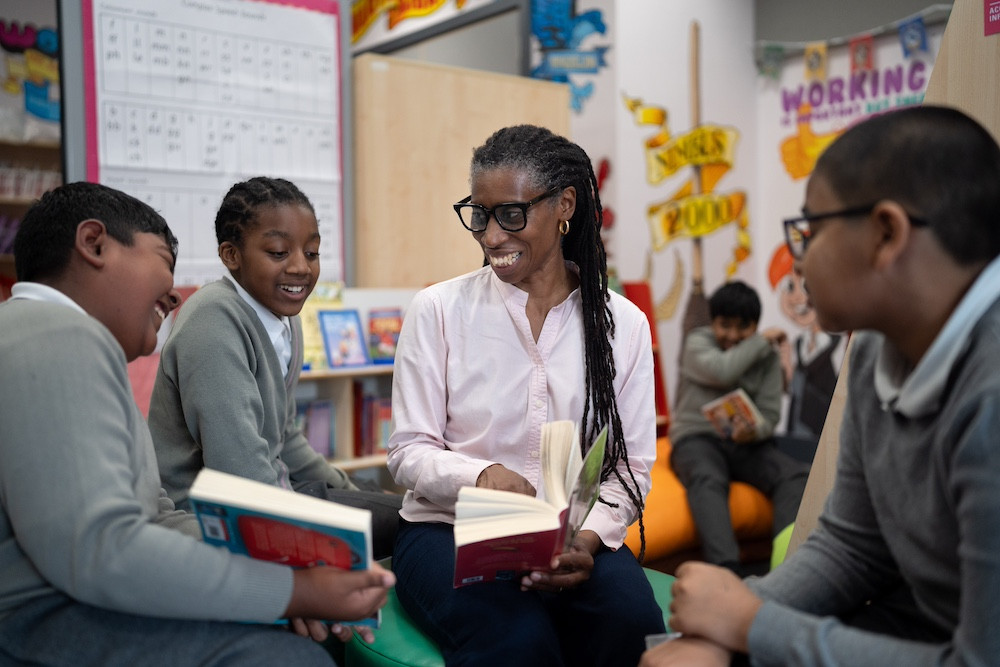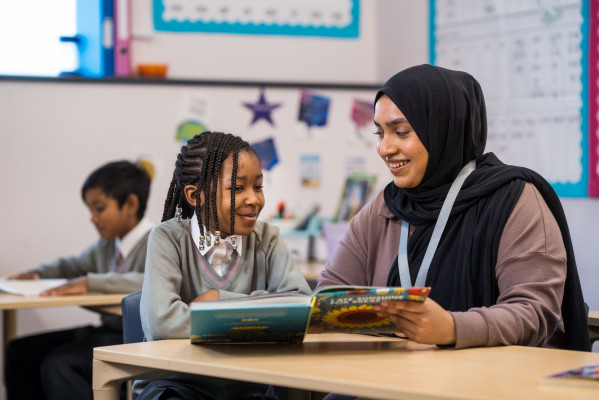Phonics and Reading
Phonics
 Words are made up from small units of sound called phonemes. Phonics teaches children to be able to listen carefully and identify the phonemes that make up each word. This helps children to learn to read words and to spell words. At St Paul’s Way Foundation School, we teach phonics using the ‘Read Write Inc. Phonics’ Programme. This is a phonics resource published by Open University Press. It aims to prepare children for learning to read by developing their phonic knowledge and skills. It sets out a detailed and systematic programme for teaching phonic skills for children, with the aim of them becoming fluent readers by age seven.
Words are made up from small units of sound called phonemes. Phonics teaches children to be able to listen carefully and identify the phonemes that make up each word. This helps children to learn to read words and to spell words. At St Paul’s Way Foundation School, we teach phonics using the ‘Read Write Inc. Phonics’ Programme. This is a phonics resource published by Open University Press. It aims to prepare children for learning to read by developing their phonic knowledge and skills. It sets out a detailed and systematic programme for teaching phonic skills for children, with the aim of them becoming fluent readers by age seven.
Parents can learn more about the Read Write Inc. Phonics Programme on the Oxford Owl website.
Intent:
At SPWPS, we are passionate about ensuring all children become confident and enthusiastic readers and writers. We believe that Read, Write, Inc. (RWI) phonics provides the foundations of learning to make the development into fluent reading and writing easier. Children learn to read fluently and at speed so they can focus on developing their skills in comprehension, vocabulary and spelling. Through RWI phonics children learn a simple alphabetic code followed by a more complex code. All reading books progress cumulatively, matched to the sound’s children are learning and already know. The teaching of phonics is of high priority.
Implementation:
• T he systematic teaching of phonics has a high priority throughout the Early Years Foundation Stage (EYFS) and Key Stage 1. Phonics is taught daily to all children in EYFS, Year 1 and those in Year 2 who have not passed the phonics screening in Year 1 or completed the Read, Write, Inc. (RWI) Phonics programme. Further to this, any pupils whom are behind in their phonics in Key Stage 2, may receive further phonics intervention if needed.
he systematic teaching of phonics has a high priority throughout the Early Years Foundation Stage (EYFS) and Key Stage 1. Phonics is taught daily to all children in EYFS, Year 1 and those in Year 2 who have not passed the phonics screening in Year 1 or completed the Read, Write, Inc. (RWI) Phonics programme. Further to this, any pupils whom are behind in their phonics in Key Stage 2, may receive further phonics intervention if needed.
• In the EYFS, a vital aspect in the development of essential knowledge and skills in phonics is the use of continuous provision. This means that children are using and developing taught skills throughout the year on a daily/weekly basis.
• We constantly provide enhancement opportunities to engage learners and link to our topics. We encourage children to be independent in the continuous provision.
• Children also take part in daily synthetic phonics sessions, which follow the Read Write Inc. scheme. Children are encouraged to transfer the skills they learn in phonics sessions into their independent reading and writing in the continuous provision.
•Daily phonics 1:1 tutoring sessions are put in place for key marginal children, who are not making the expected progress – we ensure that no child gets left behind.
•Weekly phonics home learning tasks are set to encourage children to practise and revise the sounds that they have been working on during the week. We also provide QR codes, which allow parents/carers to be able to access RWI videos, that can support them with their child at home.
Children are taught to:
- decode letter/sounds correspondences quickly and effortlessly, using their phonic knowledge and skills
- read ‘tricky’ (red words) on sight
- understand what they read
- read aloud with fluency and expression
- write confidently, with a strong focus on vocabulary and grammar
- spell quickly and easily by segmenting the sounds in words
- acquire good handwriting
Reading
 Once children are reading fluently, having followed the Read, Write Inc. Programme for phonics to develop their early reading, our literacy lessons and reading lessons support children to read effectively for both information and for enjoyment. Our teachers carefully plan lessons to support children with reading comprehension, inference, prediction, evaluation and synthesis of ideas. We are committed to ensuring children read high-quality texts that are language rich, from a wide range of genres and authors.
Once children are reading fluently, having followed the Read, Write Inc. Programme for phonics to develop their early reading, our literacy lessons and reading lessons support children to read effectively for both information and for enjoyment. Our teachers carefully plan lessons to support children with reading comprehension, inference, prediction, evaluation and synthesis of ideas. We are committed to ensuring children read high-quality texts that are language rich, from a wide range of genres and authors.
We aim for our pupils to:
- Read easily, fluently and with good understanding
- Develop the habit of reading widely and often, for both pleasure and information
- Acquire a wide vocabulary, an understanding of grammar and knowledge of linguistic conventions for reading, writing and spoken language
- Appreciate our rich and varied literary heritage
- Use discussion in order to learn; they should be able to elaborate and explain clearly their understanding and ideas
- Be competent in the arts of speaking and listening, making formal presentations, demonstrating to others and participating in debate
- Apply their reading skills across all areas of the curriculum.
Reading implementation
Our reading curriculum integrates phonics, vocabulary development, comprehension strategies, and critical thinking skills to provide a holistic approach to reading. Our vision is to develop the pupils’ reading fluency and enhance reading comprehension and critical thinking skills through the effective use of the VIPERS strategy. We aim to empower our pupils to become skilled, analytical readers who can extract meaning from a variety of texts and engage in thoughtful discussion about their reading.
During reading lessons, we teach our pupils how to critically analyse texts by applying VIPERS to understand vocabulary in context, make inferences about the text, predict outcomes, explain their thinking, retrieve information from the text and summarise key points. The VIPERS approach encourages critical thinking by prompting pupils to delve into the text’s deeper meaning, examine the author’s choices and connect the text to broader themes. We use the VIPERS strategy with various text types, including fiction and non-fiction, to expose our pupils to a wide range of literary experiences. Pupils have the opportunity to verbally respond to a text (reciprocal reading) and use their oracy skills to answer reading comprehension questions but also answer comprehension questions in their reading books.
Our reading curriculum is designed to accommodate varying reading levels. At SPWP we recognise and cater to the needs of all pupils and we ensure that our pupils with special educational needs have access to appropriate reading support, which includes 1:1 reading interventions and additional resources or adapted materials.
 Teachers use formative assessment and continuously assess the pupils and provide live feedback during the reading lessons, monitoring the pupils’ progress and adapting instruction as needed. Teachers also use summative assessments throughout the year to assess the pupils and identify their reading levels and needs. Furthermore, pupils are encouraged to reflect at the end of every reading lesson. Teachers monitor and review the pupils’ responses and use them as evidence to assess the pupils and inform their planning.
Teachers use formative assessment and continuously assess the pupils and provide live feedback during the reading lessons, monitoring the pupils’ progress and adapting instruction as needed. Teachers also use summative assessments throughout the year to assess the pupils and identify their reading levels and needs. Furthermore, pupils are encouraged to reflect at the end of every reading lesson. Teachers monitor and review the pupils’ responses and use them as evidence to assess the pupils and inform their planning.
At SPWP we train our teachers to stay updated with the latest research-based practices in reading and to effectively teach reading skills. We provide ongoing support and resources to help them implement the reading curriculum effectively.
We encourage the parents to support their children’s reading at home through home-reading books and regular communication about their children’s reading progress. We also provide parental guidance on reading at home by organising reading workshops for parents. We engage with the community and organise events like book fairs, story-art family homework, enrichment days (World Book Day) and DEAR time to create excitement about reading.
At SPWP we incorporate reading into other subjects to reinforce literacy and reading skills across the curriculum. We continuously gather feedback from pupils and teachers to make adjustments to the curriculum and instructional methods as needed.
We encourage independent reading allowing pupils to choose books at their appropriate reading level and we also offer time for reading for pleasure. The teachers daily read aloud to pupils during the ‘class novel time’, modelling good reading habits and exposing them to a wide range of texts.
Reading At Home
All children have a reading book that they take home to read; we recommend that children should read at home daily to support their language and vocabulary development, and their reading fluency. Whilst they are in the earlier stages of learning to read, children will have a levelled reading book. We use a range of different schemes for this, including Oxford Reading Tree. Whilst children are following the Read Write Inc. Phonics Programme, they will regularly bring home a book from this scheme, which is matched to their current phonics learning. In addition to this, we encourage children to visit the library, read widely and to listen to adults reading stories and books to them.




